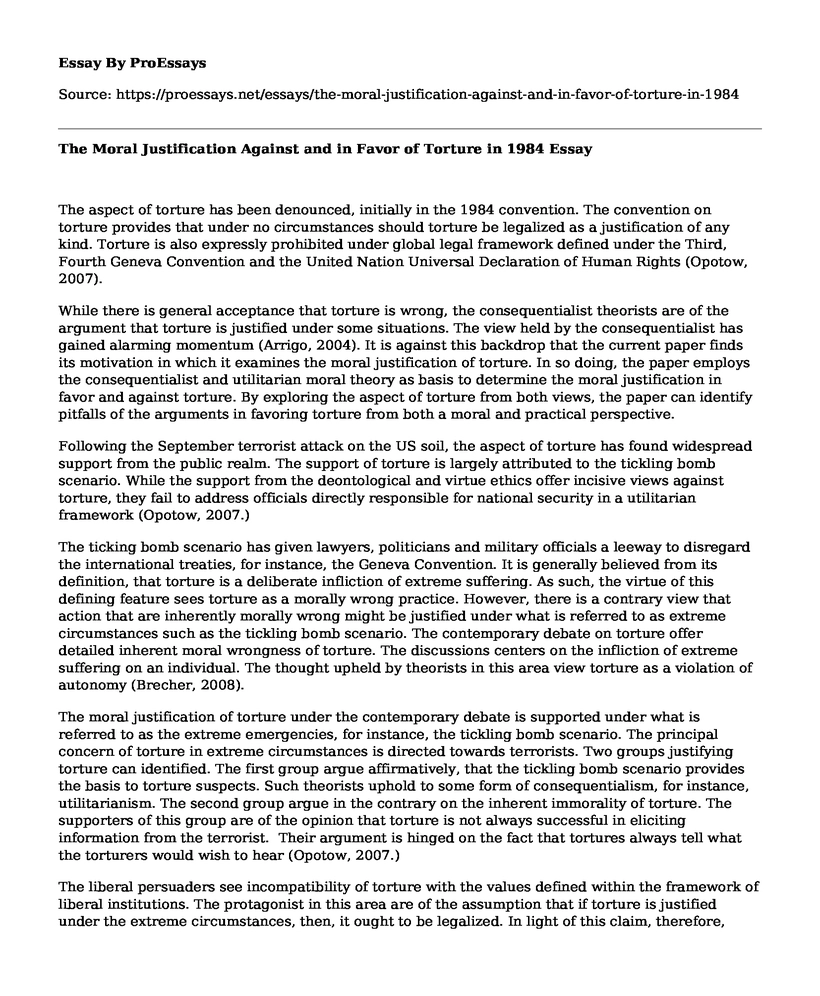The aspect of torture has been denounced, initially in the 1984 convention. The convention on torture provides that under no circumstances should torture be legalized as a justification of any kind. Torture is also expressly prohibited under global legal framework defined under the Third, Fourth Geneva Convention and the United Nation Universal Declaration of Human Rights (Opotow, 2007).
While there is general acceptance that torture is wrong, the consequentialist theorists are of the argument that torture is justified under some situations. The view held by the consequentialist has gained alarming momentum (Arrigo, 2004). It is against this backdrop that the current paper finds its motivation in which it examines the moral justification of torture. In so doing, the paper employs the consequentialist and utilitarian moral theory as basis to determine the moral justification in favor and against torture. By exploring the aspect of torture from both views, the paper can identify pitfalls of the arguments in favoring torture from both a moral and practical perspective.
Following the September terrorist attack on the US soil, the aspect of torture has found widespread support from the public realm. The support of torture is largely attributed to the tickling bomb scenario. While the support from the deontological and virtue ethics offer incisive views against torture, they fail to address officials directly responsible for national security in a utilitarian framework (Opotow, 2007.)
The ticking bomb scenario has given lawyers, politicians and military officials a leeway to disregard the international treaties, for instance, the Geneva Convention. It is generally believed from its definition, that torture is a deliberate infliction of extreme suffering. As such, the virtue of this defining feature sees torture as a morally wrong practice. However, there is a contrary view that action that are inherently morally wrong might be justified under what is referred to as extreme circumstances such as the tickling bomb scenario. The contemporary debate on torture offer detailed inherent moral wrongness of torture. The discussions centers on the infliction of extreme suffering on an individual. The thought upheld by theorists in this area view torture as a violation of autonomy (Brecher, 2008).
The moral justification of torture under the contemporary debate is supported under what is referred to as the extreme emergencies, for instance, the tickling bomb scenario. The principal concern of torture in extreme circumstances is directed towards terrorists. Two groups justifying torture can identified. The first group argue affirmatively, that the tickling bomb scenario provides the basis to torture suspects. Such theorists uphold to some form of consequentialism, for instance, utilitarianism. The second group argue in the contrary on the inherent immorality of torture. The supporters of this group are of the opinion that torture is not always successful in eliciting information from the terrorist. Their argument is hinged on the fact that tortures always tell what the torturers would wish to hear (Opotow, 2007.)
The liberal persuaders see incompatibility of torture with the values defined within the framework of liberal institutions. The protagonist in this area are of the assumption that if torture is justified under the extreme circumstances, then, it ought to be legalized. In light of this claim, therefore, torture need to be warranted under extreme emergencies. In what can be inferred to as the age of terror, the once and immovable stand against torture finds itself in a murky ground. The terrorism has made it easy for academics, politicians and lawyers to justify torture under what is has been referred to as tickling bomb or extreme emergencies.
References
Opotow, S. (2007). Moral Exclusion and Torture: The Ticking Bomb Scenario and the Slippery Ethical Slope. 13(4) Peace and Conflict: Journal of Peace Psychology 457-461
Arrigo, M. (2004). A Utilitarian Argument against Torture Interrogation of Terrorists, Science and Engineering Ethics, 10, 54372.
Brecher, B. (2008), Torture and the Ticking Bomb, Oxford: Blackwell.
Cite this page
The Moral Justification Against and in Favor of Torture in 1984. (2021, Dec 19). Retrieved from https://proessays.net/essays/the-moral-justification-against-and-in-favor-of-torture-in-1984
If you are the original author of this essay and no longer wish to have it published on the ProEssays website, please click below to request its removal:
- Critical Essay on Use of Racial Slurs in the Adventures of Huckleberry Finn
- Everyday Use's Theme and Style Essay Example
- Michael Radford's "1984" and George Orwell's "Nineteen Eighty-Four" Essay
- Critical Essay Sample on To Kill a Mockingbird
- Exploring the Theme of Love in John Donne's "The Canonization" Essay Example
- Gothic Elements in Faulkner's "A Rose for Emily" - Essay Sample
- Paper Example on Poetry Analysis







